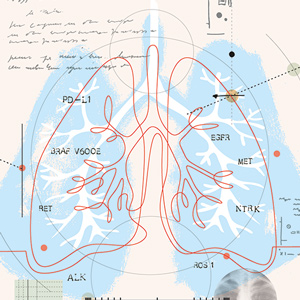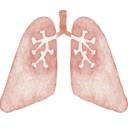-
Forward Look
What’s Next? Fall 2020A therapeutic vaccine targeting advanced cervical cancer.
by Anna Azvolinsky
-
More Choices to Treat Lung Cancer
Advances in precision medicine and immunotherapy have led to better treatments for many patients with advanced lung cancer. But having a wider selection of therapies to choose from can make treatments more complex.
by Kendall K. Morgan
-
Survivor Profile
An Unlikely PivotMedha Deoras-Sutliff's experience with breast cancer fueled her interest in advocacy for breast cancer patients and, more recently, her support for research on rare cancers.
by Lindsey Konkel
-
Planning to Survive
Survivorship care plans can prepare cancer patients to get the best medical care and maintain their quality of life following treatment.
by Carly Flumer
-
Targeted Therapy for Early-Stage Lung Cancer?
A trial of the targeted therapy Tagrisso (osimertinib) for early-stage lung cancer finds that patients who take it go longer without having a cancer recurrence. Whether that should change clinical practice is under discussion.
by Ashley P. Taylor
-
Cervical Cancer Screening Guideline Updated
A new version of the American Cancer Society's cervical cancer screening guideline says screening can start at a later age and highlights human papillomavirus testing as the preferred method.
by Anna Azvolinsky
-
A Missed Conversation
Despite national guidelines urging oncologists to bring up risks of infertility posed by cancer treatment, many young cancer patients are never told about these risks or counseled on their fertility preservation options.
by Marcus A. Banks
-
Anal Cancer Diagnoses and Deaths Are Rising in the U.S.
Study underscores importance of early detection and prevention.
by Jane Langille
-
The Pandemic’s Impact on Cancer Screening and Detection
Delays in cancer screening and diagnosis due to the COVID-19 pandemic put people at risk.
by Kevin McLaughlin
-
The Return to Work
What happens if your workplace reopens before you're ready to return or you're an essential worker? For some people who have been diagnosed with cancer, accommodations may be possible.
by Jen Tota McGivney
Cancer Talk
The Power of Comedy
In a new play, the pain of cancer can be a chance to laugh.
by Ashley P. Taylor
Melanoma Risk in Childhood Cancer SurvivorsPeople treated for childhood cancer found to have twice the risk of developing melanoma as an adult.
by Cameron Walker
Online Second OpinionsMore than half of patients who participated in a program offering online second opinions were recommended a change to their treatment plan.
by Eric Fitzsimmons
Musical Toxicity an Effect of Cancer TreatmentStudy finding cancer treatment affects ability to play or sing music highlights need for physical therapy, experts say.
by Kyle Bagenstose















